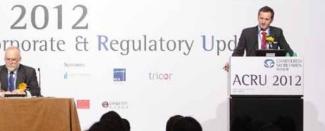Will company secretaries be personally liable for breaches of Hong Kong's new statutory requirements for the disclosure of price-sensitive information? How should company secretaries prepare themselves for the abolition of par value shares? The pace of regulatory change shows no sign of abating in Hong Kong. Small wonder then that this years’ Annual Corporate and Regulatory Update (ACRU) seminar was packed to capacity. CSj highlights the major compliance issues raised at the seminar.
T he Institute's Annual Corporate and Regulatory Update seminar has grown to become the most popular event in the CPD calendar and this years’ event drew a record audience of 850 practitioners (not to mention the further 200 hopefuls on a waiting list). This year's event was particularly timely since practitioners need to prepare themselves for a number of major changes to Hong Kong's regulatory environment, including changes to:
- the Corporate Governance Code and associated listing rules (effective April this year) – speakers discussed the new section on company secretaries, higher standards for directors’ duties and training and the work of board committees
- the revised Securities and Futures Ordinance (effective 1 January 2013) – speakers discussed the new statutory requirements for the disclosure of price-sensitive information, and
- the revised Companies Ordinance (effective late 2013/ early 2014) – speakers discussed the abolition of par value shares and the Memorandum of Association.
The Securities and Futures Commission (SFC), Hong Kong Exchanges and Clearing (HKEx) and the Companies Registry were on hand to brief attendees on these critical developments. As usual, however, the seminar was a mix of regulatory issues and more practical issues in company secretarial practice. This year the Companies Registry and the Inland Revenue Department briefed attendees on the advantages for practitioners of their new e-services.
Regulatory issues
Building a disclosure culture
The SFC fielded two speakers – Mark Steward, Executive Director of Enforcement, and Charles Grieve, Senior Director of Corporate Finance – to prepare practitioners for the transition to Hong Kong's statutory price-sensitive information (PSI) disclosure regime. One of their central themes was that the new regime will require a change of mindset. 'It will require a cultural shift in Hong Kong,’ said Mr Steward. He added that the main responsibility for ensuring that minds do indeed change does not lie with the SFC. 'That belongs with the market, with companies and with you. The SFC enforcement capacity should only be a backstop if that doesn’t happen,’ he said. This point was reenforced by Mr Grieve, 'we can take action, but we don’t want to do this through enforcement,’ he said.
Enforcement, however, is Mr Steward's day job and he took the opportunity of the ACRU forum to explain the SFC's general approach to it. 'Our approach is not only to take action against misconduct, where the focus is on the wrongdoer, but also to remediate the consequences of fraud and misconduct, where the focus is on the wrongdoing,’ he said. 'Seeing the wrongdoer in jail doesn’t really help you if you’ve lost all your money’.
He then turned to a number of recent cases of the misuse of inside information by way of introduction to Hong Kong's new PSI disclosure regime. He urged company secretaries to ensure their companies have good internal controls to effectively manage inside information between the time the information comes into being and the moment of disclosure.
These controls should include processes to identify sensitive information, protect confidentiality before disclosure and ensure disclosure is efficient and timely. 'Proper, well-defined controls should become a habit, a discipline,’ he said, 'for companies and for company secretaries. I don’t want to overstate the role of company secretaries, they are one among many players, but the role and function of company secretaries is a key one in ensuring that information is not abused.’
He then turned to a topic of particular interest to company secretaries regarding the new PSI regime – liability.
He acknowledged that there have been significant concerns about the personal liability of company secretaries for breaches of the statutory PSI requirements. 'There has been concern that we are imposing liability on individuals, but it is important to bear in mind that the legislation does not impose personal liability on company officers trying to do the right thing. Getting it wrong is not the trigger for liability, personal liability for officers is dependent on proof of actual fault,’ he said. He stressed that there would need to be proof of intention, recklessness, and/ or negligence for company secretaries to be personally liable.
He added that similar statutory requirements in other jurisdictions did not open the floodgates of personal liability cases. In fact, actions have tended to be against companies rather than individual officers.
Preparing for Hong Kong's new Companies Ordinance
It has been a long time coming, but Hong Kong's new Companies Ordinance is expected to be implemented in late 2013 or early 2014. Phyllis Mckenna, Deputy Principal Solicitor (Company Law Reform), Companies Registry, updated ACRU attendees on two significant reforms which the new ordinance will implement.
-
Retiring the concept of par value.
The 'par’ or 'nominal’ value of a share is the minimum price at which the share can be issued. The Companies Bill abolishes this concept since, Ms Mckenna pointed out, it no longer serves its original purpose of protecting creditors and shareholders and gives no indication of the real value of shares.
The Ordinance adopts a 'big bang’ approach to the abolition of par value. This means that, upon the commencement of the revised Companies Ordinance, there will be a mandatory migration to no par for all companies with a share capital. The concepts of 'nominal value' and 'share premium’ will be abolished. The existing share capital amount will be amalgamated with the share premium account and capital redemption reserve. There will be deeming provisions to ensure that contractual rights defined by reference to par value and related concepts will not be affected by the abolition of par. 'The deeming provisions will save considerable work, expense and time for companies and reduce the possibility of disputes,’ said Ms Mckenna.
She added that this mandatory migration to no par will be simpler for all concerned. 'An optional no par system would require legislating for, and administering, two parallel legal systems, thus necessitating additional costs and complexity,’ she said. She also pointed out that the commencement date of the Companies Bill is expected to be at least 14 months after its enactment, so there will be a transition period to allow companies to review their articles etc. 'I urge you to look at your constitutional documents to see if there is anything you need to do,’ she said.
-
Abolition of the Memorandum of Association.
Another retiree under the revised Companies Ordinance will be the Memorandum of Association. Ms Mckenna explained that, with the abolition of the Ultra Vires rule, objects clauses have become less significant for most companies and the need for the Memorandum as a separate constitutional document has diminished.
Upon the commencement of the revised Ordinance, companies can incorporate with the relevant incorporation form and a copy of the Articles of Association – there will be no need for a Memorandum. Of course, this does raise the question of what a company with an existing Memorandum should do. 'They don’t have to do anything,’ said Ms Mckenna, 'the existing memorandum will be deemed to be an Article of Association.’ She also clarified that provisions in an existing Memorandum will be deemed to be provisions of the company's Articles. Moreover, in any ordinance in force before the commencement of the revised Companies Ordinance or in any other document made before that date a reference to the Memorandum is a reference to the company's Articles and a reference to a condition of the Memorandum is a reference to a condition of the Articles.
Corporate governance changes
The Exchange's latest revisions to the Corporate Governance Code and associated listing rules took effect in April this year (except for the requirement that INEDs represent at least one-third of the board which becomes effective 31 December 2012). Two speakers from HKEx – Michael Cheng, Senior Vice-President, and Ellie Pang, Assistant Vice-President – updated attendees on these changes.
These changes have been covered in this journal (see CSj, January and February 2012 editions) and are therefore not discussed in detail here. The changes are nevertheless highly relevant to company secretaries in Hong Kong – not least because they centralise the role of company secretaries in corporate governance. Ms Pang said the new section in the code devoted to the company secretary (section F) is designed to highlight the important role of company secretaries in corporate governance. 'To elevate the company secretary position in companies we have brought in a code provision that company secretaries should report to the chief executive or the chairman,’ she said.
She also highlighted the new code provision stating that the board's decision to appoint or dismiss the company secretary should be made at a physical board meeting rather than by written resolution. 'We believe that the appointment or dismissal of the company secretary is an important matter, and should be decided by a physical meeting to give the board the opportunity to hear and debate all the issues.’
ESG reporting
The Exchange also highlighted its new initiative to encourage wider reporting on environmental and social issues in Hong Kong. It recently published its draft Environmental, Social and Governance Reporting Guide. Sarah Chow, Senior Manager, HKEx, updated ACRU attendees on the intentions of the guide.
She started her presentation with a snap poll on the number of attendees who are involved in 'ESG’ reporting. Very few hands were raised. This may not, however, be representative since the term 'ESG’ is relatively new. Companies may see their ESG reporting as 'corporate sustainability’, or 'environmental’, or 'corporate social responsibility’ reporting. Ms Chow demonstrated that over the last two decades the nature of non-financial reporting has expanded. Where initially it was overwhelmingly concerned with the environment, now it typically includes social issues and has become a lot more integrated in nature (see 'Global nonfinancial reporting by type' on page 19).
‘ESG’ stands for environmental, social and governance. The governance side of things is relatively well looked after in Hong Kong, but the two other pillars – environmental and social – are relatively neglected. Ms Chow's main theme was that 'your ESG report is not a public relations document.’ Informal feedback received by the Exchange has indicated that some companies are avoiding addressing environmental and social issues because they don’t want to focus on 'negative' issues. Company reports need to address the issues of concern to stakeholders, she pointed out, and issues like pollution, climate change and employee health and safety are therefore highly relevant.
She quoted, on an anonymous basis, a corporate social responsibility statement from a recent annual report of a Hong Kong company to demonstrate the need for a much more rigorous approach to ESG reporting, particularly in the context of the increasing awareness among investors about the risks companies face as a result of environmental and social issues. A statement about how the company 'cherishes the natural environment’ is not that helpful to investors who want to know about the company's emissions, energy usage or waste generation. Similarly, a statement that the company is 'treating its employees with respect’, does not inform investors about the company's employee turnover rate or the number of work fatalities in the year.
Investors want to know what companies are doing to address environmental and social risks, she pointed out. The new ESG guide therefore suggests ways companies can start using 'key performance indicators’ to track their performance in areas including: working conditions, health and safety, labour standards, emissions, use of resources, the environment and natural resources, supply chain management, product responsibility, anti-corruption and community investment.
Connected transactions
There has been an increasing focus on the regulation of connected transactions in Hong Kong, and the listing rules now contain new safeguards against listed issuers’ directors, chief executives and substantial shareholders (or their associates) taking advantage of their positions when the listed issuer enters into such transactions. Ms Christine Kan, Senior Vice-President, HKEx, updated ACRU attendees on the new HKEx Guide on Connected Transaction Rules which was published on HKEx website in April 2012. The guide is available on the HKEx website (www.hkex.com.hk) via Rules and regulations/ Guidance on listing matters/ Guidance materials/ Other matters.

Practical issues
Electronic incorporation
Over the last decade the Companies Registry has made major advances in the computerisation of its services. Wendy Ma, Deputy Registry Manager (Development), gave ACRU attendees an update on some of the key e-services for company secretaries, such as the e-submission of annual returns. Her colleague, Nancy Yau, Deputy Registry Manager (Company Formation & Enforcement Division), updated attendees on the highest profile of the Registry's new e-services – the e-incorporation service. This service has been available since 18 March 2011, but uptake has been relatively slow (see CSj, April 2012, pages 6–10). Ms Yau urged ACRU attendees to make use of the new service which can reduce the time needed for incorporation from four days to one hour. She also gave a number of tips on how to get the best out of the service – in particular via the user registration process, the use of model M&As, e-form filling and signing and payment methods.
Electronic tax
This year's ACRU seminar also included a presentation by the Inland Revenue Department (IRD) on electronic tax (e-tax). Tse Yuk Yip, Assistant Commissioner of Inland Revenue, gave some tips on how to open an e-tax account, the e-filing of tax returns and the e-payment of tax demands. She outlined the benefits of migrating to e-tax. 'We are committed to collecting revenue efficiently and cost effectively,’ she said. Her presentation also addressed the issue of business registration. The IRD, in conjunction with the Companies Registry, has launched a one-stop online company and business registration service via the e-Registry (
www.eregistry.gov.hk).
More information on the Institute's CPD events is available on the HKICS website (www.hkics.org.hk)



